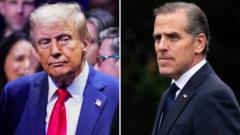Amid high-profile prosecutions, both Joe Biden and Donald Trump have made similar claims regarding political bias in their legal battles. As Biden pardons Hunter Biden, they highlight a growing public distrust in institutions and the justice system itself, suggesting an unsettling trend in American politics.
The Political Currents of Justice: Examining Biden and Trump's Legal Challenges

The Political Currents of Justice: Examining Biden and Trump's Legal Challenges
A look into the legal troubles faced by Hunter Biden and Donald Trump reveals striking parallels in their political narratives, raising questions about the integrity of the American justice system.
Donald Trump and Joe Biden may seem like polar opposites in many respects, but their recent engagements with the legal system underline some disconcerting similarities. Both have faced significant scrutiny from prosecutors, stirring echoing sentiments that are shaping their political narratives.
In a striking move, President Joe Biden announced a “full and unconditional” pardon for his son Hunter Biden, whom he claims faced “unfair prosecution.” Biden expressed his belief that the legal actions against Hunter are driven by his familial connections. “No reasonable person who looks at the facts of Hunter’s cases can reach any other conclusion than Hunter was singled out only because he is my son – and that is wrong,” the president articulated. This rhetoric closely mirrors Donald Trump’s own affirmations during his controversies, notably referencing the hush-money payments case linked to adult film actress Stormy Daniels, where he similarly accused the judicial system of being politicized.
Trump’s defenders, including Republican Senator Lindsey Graham, branded the New York case as “an outrage,” reinforcing the narrative of selective prosecution for political objectives.
Diving deeper into the cases at hand, both the Hunter Biden allegations and Trump’s hush-money scandal were initiated in 2024, several years after the related events unfolded. Trump’s payments to Daniels date back to 2016, while Hunter’s legal troubles with his firearm permit and tax returns occurred between 2016 and 2019. These respective timelines have fueled criticisms about the justice's timing and motivations.
Moreover, the situations bear remarkable similarities in how legal statutes were applied. Trump’s campaign finance violations were federal, yet were dropped by US authorities, while Hunter Biden faced charges under unusual circumstances for gun-related issues. Trump’s legal team noted these parallels explicitly in filings, indicating that Biden's pardon infers that political influence mars judicial processes.
However, differences abound. Hunter Biden never held a public office, and Trump is embroiled in multiple legal battles, many bearing implications of more severe allegations. Yet, both men have dipped into similar rhetoric, raising concerns about whether political biases affect prosecutorial decisions.
Experts observe a trend where high-profile individuals often polarize public perception of justice, casting a shadow over the nation’s trust in its institutions. Kevin McMunigal, a law professor, argues that there is a complex interplay of invoking criminal statutes where they might go unprosecuted without significant misdeeds.
This potential double standard has stirred a growing sentiment of distrust among the public. Political science experts suggest this could contribute to a systemic crisis of faith in governmental structures, which both leaders are leveraging to bolster their political positions in tricky scenarios.
As Biden extends a protective hand over his son through a presidential pardon, questions linger about Trump, who looks towards a potential White House return, seemingly insulated from the repercussions of his legal troubles. The growing chasm in public trust could well impact how Americans perceive justice when it is meted out to those within their political elite.
The examples set forth by Trump and Biden resonate across the fora of American politics, suggesting that responsibility and justice may not be equally distributed, reaffirming a narrative that resonates deeply in the political landscape today.



















